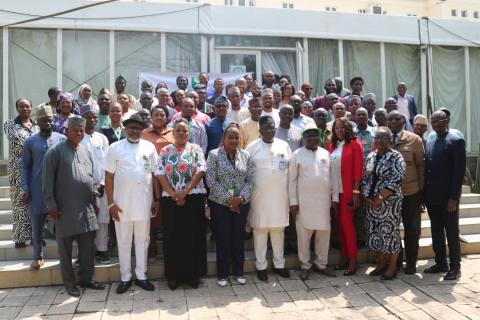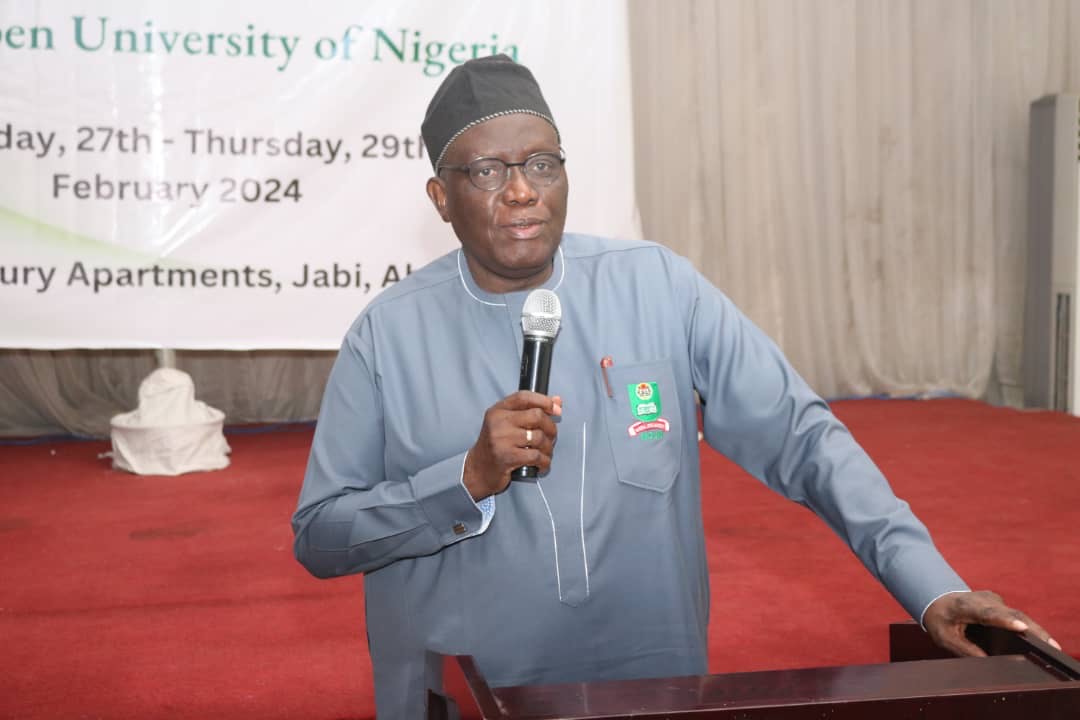
The National Open University of Nigeria (NOUN) has held an induction workshop for the new teaching and non-teaching staff recently employed by the institution in its bid to ensure the provision of highly accessible and quality education to Nigerians.
The event, which took place at the AES Luxury Apartment, Jabi, Abuja, had in attendance all the staff who were employed from the year 2021 till date.
All Principal Officers of the university and the 202 new staff from the FCT and other states attended the workshop which was anchored by the Regional Training and Research Institute for Distance and Open Learning (RETRIDOL).
The Vice-Chancellor, Prof. Olufemi Peters, who declared the workshop open, and also personally took the participants on some sessions, expressed how nervous he was to take them on the journey so far in NOUN, as it reminded him of where he was 21 years ago when he joined the institution.
“This exercise used to be of utmost importance to anyone who joined NOUN. When I came in and saw the crowd, I was pleasantly surprised because it means from 2021 about 200 staff have joined us. This means that we are really growing. When people come to NOUN, certain things are lost on them and that is the reason why we need to go through this induction.
“I want to thank the Directorate of Staff Training & Development, for now having a focus that staff in the university must be trained, and also the RETRIDOL directorate whose portfolio is also to engage to train us in ODL upon which this particular training was entrusted to them. We are trying to see how we can change the narrative about the philosophy of working here.
“When I was employed in 2003, I had the privilege of going through what you’re going through; and it set the stage for my understanding of what NOUN is all about. At that time, we were a family. We think this is necessary because it will lay a very solid foundation,” he said.
According the him,“We need to understand the philosophy of NOUN. For many of you who know me, you know that for me this is a business. If it is not business, we wouldn’t have many conventional universities establishing it.
“But for us, it is not just the money, we need the money to run our large bureaucracy, but for us, it is the philosophy; the fact that we can consider someone in prison and educate him or her; the fact that we can provide for the women in the rural parts of northern Nigeria to make available education to them; to make people have self-actualization; that in itself is the reason why we are here.”
He said henceforth, anybody employed in NOUN would have to go through a MOOC course, register for it, go through the induction and sit for exam and then get a certificate.
The VC explained that whoever doesn’t pass the induction exams would not be confirmed, adding that for those who transferred their services, they would also write the exam and peradventure they don’t pass, they won‘t be paid their ODL allowance until they pass.
 On her part, the RETRIDOL director, Prof. Christine Ofulue, said the induction was first intended to hold virtually, but was later decided upon to be divided into two parts.
On her part, the RETRIDOL director, Prof. Christine Ofulue, said the induction was first intended to hold virtually, but was later decided upon to be divided into two parts.
“Initially when we started the planning, what we had in mind to do was to develop a short course online so that any time new staff are appointed they won’t have to wait for an induction workshop like this. They simply go online, complete the induction and then present demonstrable evidence that they have completed it. That is still going to go on because that is going to be the second part of this programme.
“As we all know, NOUN is a specialised institution. it is not like the conventional or traditional universities and so the primary aim and purpose of the workshop is to provide the participants with an understanding of the institutional culture and rationale behind our practices, policies and processes.
“It is also to equip new staff with the skills necessary for you to be able to navigate, excel and contribute your quota within the system,” she said.
Ofulue stated that the objective of the workshop was to provide the participants with an overview of open and distance learning, acquainting them with the history, values, mission and vision of NOUN, among others.
“The criteria for selection was based on those who had assumed duty since 2021. After this 3-day workshop, we will have a brief break, and in about two weeks, we will inform you and then commence the online aspect of it. Eligibility for certificates will be based on the completion of both this onsite and online workshop,” the director added.
NOUN Registrar, Mr. Oladipo Ajayi, in his welcome address, stated that the workshop holds a particular significance as it was an opportunity for staff to come together and embark on a shared journey of knowledge and growth within the unique context of the institution.
“At NOUN, our commitment in providing quality education through ODL is unwavering. In the landscape of higher education, the dynamics of ODL brings forth both challenges and opportunities.
“The flexibility offered by our approach allows us to reach learners far and wide and by this workshop you will know the peculiarities of ODL and why it is different from the conventional model,” Ajayi said.
The opening ceremony climaxed with a vote of thanks by the Director, Staff Training and Development, Mrs. Eunice Riki, who appreciated the university management for providing and sparing resources and time to induct the newly employed staff.
During the course of the induction programme, topics presented were: the Vision, Mission and Processes of NOUN, Academic Operations and Roles in ODL, by Prof. Olufemi Peters; the History and Overview of ODL, Institutional Typologies & ODL Sub-systems by Prof. Christine Ofulue, and F.K. Olakulehin; Administrative Operations and Roles in ODL by Mr. Oladipo Ajayi; Technological Operations and Roles by Mr. Y. Adeboyejo; Learners Support Services by Prof. R. Ogidan and Dr. S. Omuya; Course Materials Development in ODL by Prof. O. Adewale; Instructional Delivery Processes by Dr. L. Bello; Examination and Assessment by Prof. O. Ojo and Towards an Institutional Culture of Quality by Prof. J. Inegbedion.

